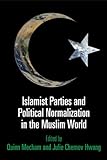Islamist Parties and Political Normalization in the Muslim World / ed. by Quinn Mecham, Julie Chernov Hwang.
Material type: TextPublisher: Philadelphia : University of Pennsylvania Press, [2014]Copyright date: ©2014Description: 1 online resource (240 p.) : 5 illusContent type:
TextPublisher: Philadelphia : University of Pennsylvania Press, [2014]Copyright date: ©2014Description: 1 online resource (240 p.) : 5 illusContent type: - 9780812246056
- 9780812209723
- 324.2/182 23
- JQ1852.A979 .I75 2014eb
- online - DeGruyter
- Issued also in print.
| Item type | Current library | Call number | URL | Status | Notes | Barcode | |
|---|---|---|---|---|---|---|---|
 eBook
eBook
|
Biblioteca "Angelicum" Pont. Univ. S.Tommaso d'Aquino Nuvola online | online - DeGruyter (Browse shelf(Opens below)) | Online access | Not for loan (Accesso limitato) | Accesso per gli utenti autorizzati / Access for authorized users | (dgr)9780812209723 |
Frontmatter -- Contents -- Introduction: The Emergence and Development of Islamist Political Parties -- 1. Islamist Parties as Strategic Actors: Electoral Participation and Its Consequences -- 2. When Is Normalization Also Democratization? Islamist Political Parties, the Turkish Case, and the Future of Muslim Polities -- 3. Patterns of Normalization: Islamist Parties in Indonesia -- 4. Between a Rock and a Hard Place: Reform, Reticence, and Realignments of the Pan-Malaysian Islamic Party -- 5. Searching for Political Normalization: The Party of Justice and Development in Morocco -- 6. Mapping the Terrain of Reform in Yemen: Islah over Two Decades -- 7. Islamist Parties, Elections, and Democracy in Bangladesh -- Conclusion: The New Dynamism of Islamist Parties -- Notes -- List of Contributors -- Index -- Acknowledgments
restricted access online access with authorization star
http://purl.org/coar/access_right/c_16ec
Since 2000, more than twenty countries around the world have held elections in which parties that espouse a political agenda based on an Islamic worldview have competed for legislative seats. Islamist Parties and Political Normalization in the Muslim World examines the impact these parties have had on the political process in two different areas of the world with large Muslim populations: the Middle East and Asia. The book's contributors examine major cases of Islamist party evolution and participation in democratic and semidemocratic systems in Turkey, Morocco, Yemen, Indonesia, Malaysia, and Bangladesh. Collectively they articulate a theoretical framework to understand the strategic behavior of Islamist parties, including the characteristics that distinguish them from other types of political parties, how they relate to other parties as potential competitors or collaborators, how ties to broader Islamist movements may affect party behavior in elections, and how participation in an electoral system can affect the behavior and ideology of an Islamist party over time.Through this framework, the contributors observe a general tendency in Islamist politics. Although Islamist parties represent diverse interests and behaviors that are tied to their particular domestic contexts, through repeated elections they often come to operate less as antiestablishment parties and more in line with the political norms of the regimes in which they compete. While a few parties have deliberately chosen to remain on the fringes of their political system, most have found significant political rewards in changing their messages and behavior to attract more centrist voters. As the impact of the Arab Spring continues to be felt, Islamist Parties and Political Normalization in the Muslim World offers a nuanced and timely perspective of Islamist politics in broader global context.Contributors: Wenling Chan, Julie Chernov Hwang, Joseph Chinyong Liow, Driss Maghraoui, Quinn Mecham, Ali Riaz, Murat Somer, Stacey Philbrick Yadav, Saloua Zerhouni.
Issued also in print.
Mode of access: Internet via World Wide Web.
In English.
Description based on online resource; title from PDF title page (publisher's Web site, viewed 30. Aug 2021)


